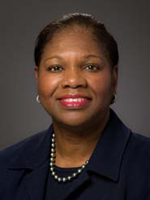31 Jan2014
By Alicia Ardila-Rey
A new resource from AACTE’s Professional Education Data System (PEDS) shows that although minority-serving institutions collectively represent a small percentage of AACTE members, they are responsible for the preparation of a disproportionately large number of minority teachers.
17 Jan2014
By Alicia Ardila-Rey
AACTE invites institutions to participate in a job fair for AACTE Holmes Scholars® to be held Sunday, March 2, at the 2014 Annual Meeting in Indianapolis.
AACTE proudly continues to host the Holmes Scholars® Program, one of the great benefits of AACTE membership. This unique program provides mentorship, peer support, and rich professional development opportunities to doctoral students from traditionally underrepresented backgrounds who are pursuing careers in education.
09 Jan2014
By Aimee Hall
 AACTE’s 2014 Speaker Spotlight Session will feature Kris Gutiérrez, professor of literacy and learning sciences at the University of Colorado at Boulder.
AACTE’s 2014 Speaker Spotlight Session will feature Kris Gutiérrez, professor of literacy and learning sciences at the University of Colorado at Boulder.
Gutiérrez uses her expertise to improve the educational condition of immigrant and other underserved students, in both school-based and community settings, and to design effective models for teacher preparation. For more than 15 years, Gutiérrez served as the principal investigator and director of an after-school computer learning club for low-income and immigrant children. She also spent over a decade directing the UCLA Migrant Scholars Leadership Program, a residential summer academic program for high school students from migrant-farmworker backgrounds.
18 Dec2013
By Aimee Hall
AACTE invites member institutions to apply to join a new initiative, Changing the Demographic Makeup of the Teaching Workforce, which will help 10 institutions increase the number of Black and Hispanic men receiving initial teaching certification through their programs.
The initiative will be AACTE’s first “networked improvement community” (NIC). NICs use the principles of improvement science to analyze a problem and design innovations. They leverage the community of participants to test and refine those interventions in a variety of contexts and to distribute those interventions broadly. AACTE’s NIC will focus on areas for intervention such as recruitment strategies, equity-based admissions policies, incentives to pursue a career in teaching, and others identified by NIC members.
18 Dec2013
By Fayneese Miller
 On December 5, the world lost one of the more important leaders of all time, Nelson Mandela.
On December 5, the world lost one of the more important leaders of all time, Nelson Mandela.
Mandela epitomized what many in U.S. educator preparation programs hope to instill in our education leaders and teachers—a strong understanding of and commitment to social justice. Unfortunately, although we believe that all children and youth should receive a high-quality education and be treated with dignity and respect in the classroom, this ideal is in sharp contrast to reality.
Far too many of our children and youth, especially those in urban communities, are in classrooms with teachers who are underprepared or simply not equipped to teach those they perceive as different. Even as many of our preparation programs are implementing practices that limit “admission” to the field of teaching to those most ready to enter the classroom after rigorous study and strong clinical practice, the different pathways to the profession that some states have put into place may lead to an increase rather than a decrease in the achievement gap that currently exists between children and youth of different classes and races.
16 Dec2013
By Aimee Hall
 This post also appears on the AACTE Annual Meeting site.
This post also appears on the AACTE Annual Meeting site.
There are about 300 sessions at each Annual Meeting and only one of you. AACTE will be recording all the general sessions and major forums for you to access later through the Learning Center, but how should you choose from the many concurrent sessions?
One way to filter your choices is by conference strand. For example, here are some sessions from Strand II: Creating Innovative and Culturally Relevant Pedagogy to get you started.
29 Oct2013
By Fayneese Miller
 As I witnessed this summer’s commemorative 50th anniversary celebrations of major U.S. civil rights events, I was reminded of my personal experiences from those times—and thought in particular of my high school English teacher, Mrs. Ruby Archie.
As I witnessed this summer’s commemorative 50th anniversary celebrations of major U.S. civil rights events, I was reminded of my personal experiences from those times—and thought in particular of my high school English teacher, Mrs. Ruby Archie.
My city, Danville (VA), was one of the last in the country to fully desegregate its elementary and secondary schools. Before its desegregation, Danville had one high school for White students and another one for Black students. My first day at the consolidated high school is one that I will never forget. My Black classmates and I were met at the entrance of the school by police officers, belts off and buckles down and at the ready, holding dogs tethered to a leash. As our first day progressed and tension remained high, all Black students were sent to the gym and the doors closed behind us. Mrs. Archie forced her way into the gym and made it clear that none of us would remain in that gym without her, our teacher, present. She cared and was willing to risk her employment to protect us.
29 Aug2013
By Sharon Robinson
Growing up in Louisville during the civil rights era, with activist parents who believed in the inherent connection between education and equality, I understood early on that a quality education can increase opportunities and improve outcomes for all children. I recall the civil rights hymn, “Woke up this morning with my mind – stayed on freedom,” which inspired so many and captured the urgency of addressing the injustice minorities faced in America at that time. Today, educational equity continues to be in the forefront of my mind.







 AACTE’s 2014 Speaker Spotlight Session will feature Kris Gutiérrez, professor of literacy and learning sciences at the University of Colorado at Boulder.
AACTE’s 2014 Speaker Spotlight Session will feature Kris Gutiérrez, professor of literacy and learning sciences at the University of Colorado at Boulder. On December 5, the world lost one of the more important leaders of all time, Nelson Mandela.
On December 5, the world lost one of the more important leaders of all time, Nelson Mandela. This post also appears on the
This post also appears on the  As I witnessed this summer’s commemorative 50th anniversary celebrations of major U.S. civil rights events, I was reminded of my personal experiences from those times—and thought in particular of my high school English teacher, Mrs. Ruby Archie.
As I witnessed this summer’s commemorative 50th anniversary celebrations of major U.S. civil rights events, I was reminded of my personal experiences from those times—and thought in particular of my high school English teacher, Mrs. Ruby Archie.